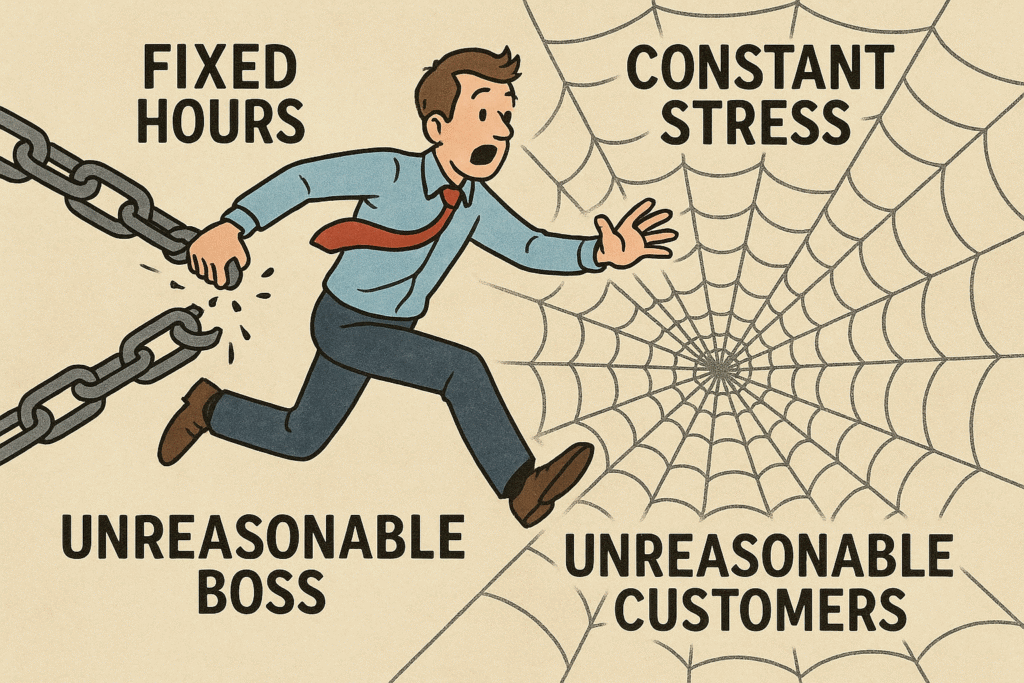The allure of entrepreneurship is strong, especially for those graduating from a prestigious institution like Oxford. The idea of forging your own path, creating something new, and potentially achieving significant financial success is appealing. There is an incredible startup ecosystem, and it’s very easy to become a part of that exciting scene. With incubators, startup pitch competitions, and driven students, combined with the advanced technical knowledge that permeates the Oxford campus, it’s a compelling proposition.
However, entrepreneurship isn’t just about big dreams and high rewards; it’s also fraught with challenges and risks that often go unnoticed due to survivorship bias. Here’s a closer look at whether you should consider this path.
The Expected Value of Entrepreneurship
The expected value of wealth from entrepreneurship, on average, is lower than what you might earn in a corporate job, especially within processional services. Over a 10-year period, the median entrepreneur earns approximately 35% less than what they could have earned in paid employment (Hamilton, 2000).This reality is often overshadowed by the success stories of entrepreneurs who have hit it big. Unfortunately, many startups fail, and even those that survive may take years to turn a profit. Admittedly, the skewed perception is often due to the fact that entrepreneurship attracts not only those with a passion for innovation but also those who have fewer traditional career options. You may have a leg up given your demonstrated drive in order to secure the Oxford offer, although by how much has yet to be quantified.
It’s important to note that many individuals are driven into entrepreneurship not by choice, but by necessity. They may struggle to find employment that suits their skills or aspirations and turn to entrepreneurship as an alternative. A few achieve breakout success, many others do not.
For someone who will graduate from Oxford, the corporate world may offer a more straightforward path to financial stability. High salaries, bonuses, and clear career progression are common and reduce volatility in your career.
With an Oxford degree, you can expect to receive a higher income – after all, this will give you a leg up in passing most employment CV screens and can impress your clients who pay your bosses for your services. However, in entrepreneurship, these credentials often matter less than you might think—unless you’re raising venture capital (VC) funding or working on B2B solutions (the halo effect will probably be more muted).
In the world of startups, your ability to execute ideas, attract customers, and adapt to market demands is far more critical than your academic background. Investors and clients care more about the traction your business is getting than the prestige of your alma mater. If you’re banking on your qualifications to give you a leg up in entrepreneurship, you may need to adjust your expectations.
Freedom from Inefficiency, But New Masters in Clients and Employees
One of the biggest draws of entrepreneurship is the freedom it promises. You’re no longer bound by the inefficiencies and bureaucracies of corporate life—you get to make the decisions and set the direction. However, this freedom comes with a new set of responsibilities.
As an entrepreneur, you’ll find that you’re now accountable to your clients and employees. Meeting client expectations, managing a team, and ensuring that your business stays afloat can become your new set of “bosses.” This trade-off is worth considering—are you prepared to swap one form of accountability for another?

Trading Stability for Volatility
Corporate jobs typically offer a level of stability that entrepreneurship does not. Regular paychecks, benefits, and job security are standard in the corporate world. Entrepreneurship, on the other hand, is often characterised by volatility. Income can be unpredictable, and the stress of keeping a business running can be overwhelming.
Consider your own risk tolerance and what truly brings you joy. Risk-averse individuals are less likely to pursue entrepreneurship because of the inherent uncertainties involved. If you are someone who values security and is uncomfortable with the idea of potentially failing, the entrepreneurial path may not align with your personality.
On the other hand, if you’re willing to take calculated risks and can handle the possibility of setbacks, entrepreneurship could offer you the challenge and fulfilment you’re looking for.
Should you take the leap?
Pursuing entrepreneurship after Oxford is a significant decision that should not be taken lightly. While it offers the potential for great rewards, it also comes with substantial risks and challenges. Consider your motivations, risk tolerance, and what you truly want out of your career before making the leap. That said, the supportive ecosystem, innovative environment and other structural benefits of being in Oxford make it a worthwhile endeavour to pursue, at least while being a student. That should give more insight to you as to whether this is something you want to pursue as a career prospect in the medium term.
References
- Hamilton, B. H. (2000). Does entrepreneurship pay? An empirical analysis of the returns to self-employment. Journal of Political Economy, 108(3), 604–631. https://doi.org/10.1086/262131